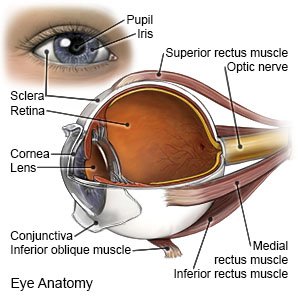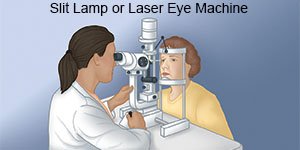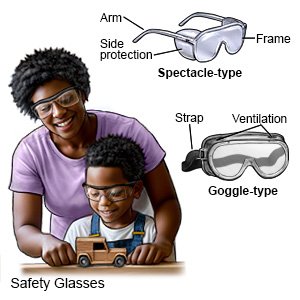Eye Foreign Body
Medically reviewed by Drugs.com. Last updated on Apr 6, 2025.
What is an eye foreign body (EFB)?
An EFB is an object that gets stuck in your eye. The object may be on the surface or in a deeper part of your eye. A FB in a deeper part of your eye may cause permanent damage or blindness. This must be treated immediately. Pieces of metal, dust, wood, and sand are the most common foreign bodies.
 |
What are the signs and symptoms of an EFB?
- Feeling like something is in your eye
- Eye pain, redness, swelling, or watering
- Sensitivity to light
- Blurry vision or changes in your vision
How is an EFB diagnosed?
Your healthcare provider will ask about your symptoms and examine your eye. Tell your provider what you were doing when symptoms began and if you know what is in your eye. The provider may check your vision by asking you to read letters or numbers off of a chart. You may need any of the following:
- A slit-lamp test uses a microscope to look into your eye and check for injury. A dye may be used to look for scratches or other damage to your eye.

- Ultrasound or CT pictures may show where the FB is located in your eye. It may also show damage to deeper parts of your eye. You may be given contrast liquid to help your eye show up better in pictures. Tell the healthcare provider if you have ever had an allergic reaction to contrast liquid.
How is an EFB treated?
Medicines will be given to decrease pain or prevent an infection. Your healthcare provider may numb your eye and flush it with liquid to help remove the FB. The provider may also use a cotton swab or other tools to help remove the FB. If the FB is hard to remove or has damaged deeper parts of your eye, you will need surgery to remove it.
What can I do to help my eye heal?
You may have pain, sensitivity to light, or blurry vision for a few days. Do the following to help your eye heal:
- Do not rub your eye. This may cause more damage or infection.
- Do not wear your contacts lenses until your eye heals. Ask your healthcare provider how long to follow this direction.
- Wear sunglasses as directed. Sunglasses help protect the eye and decrease sensitivity to light.
What can I do to prevent another EFB?
- Wear safety glasses, eye shields, or goggles. These items can prevent eye injury. Make sure the eyewear wraps around the sides of your face. Wear these items while you work with chemicals, metal, wood, or bodily fluids such as blood. Also wear protective eyewear during sports such as racquetball or swimming. Do not use regular eye glasses for eye protection. They will not protect your eyes from foreign bodies or chemicals.

- Use contact lenses as directed. Wash your hands before you clean, insert, or remove your contacts. Insert and remove contact lenses correctly. Clean and change your contacts as directed to help prevent eye damage or infection.

When should I seek immediate care?
- You suddenly lose your vision.
- You have severe eye pain.
When should I call my doctor or ophthalmologist?
- You have new or worse eye swelling.
- Your symptoms do not get better, even after the foreign body is removed.
- You have white or yellow fluid draining from your eye.
- You have questions or concerns about your condition or care.
Care Agreement
You have the right to help plan your care. Learn about your health condition and how it may be treated. Discuss treatment options with your healthcare providers to decide what care you want to receive. You always have the right to refuse treatment. The above information is an educational aid only. It is not intended as medical advice for individual conditions or treatments. Talk to your doctor, nurse or pharmacist before following any medical regimen to see if it is safe and effective for you.© Copyright Merative 2025 Information is for End User's use only and may not be sold, redistributed or otherwise used for commercial purposes.
Learn more about Eye Foreign Body
Treatment options
Care guides
Further information
Always consult your healthcare provider to ensure the information displayed on this page applies to your personal circumstances.
